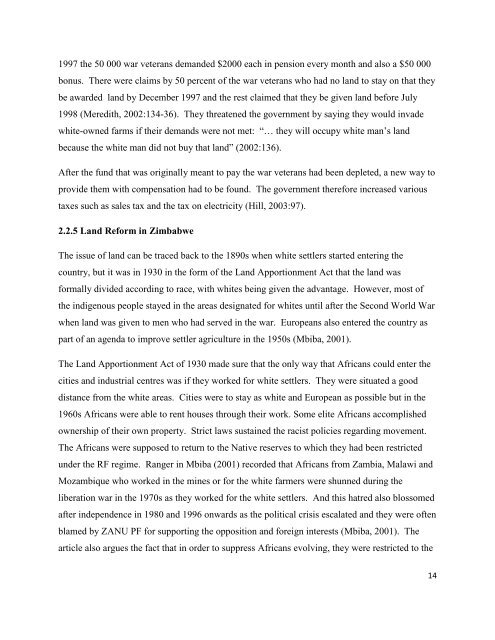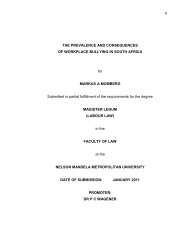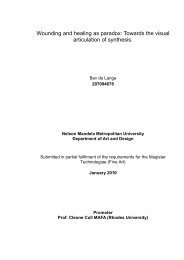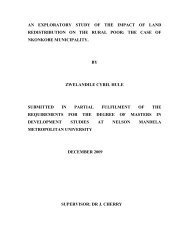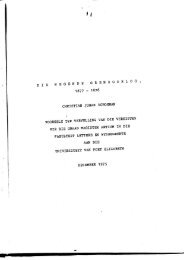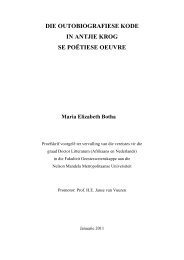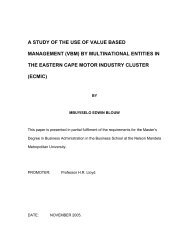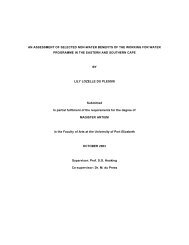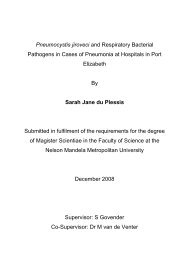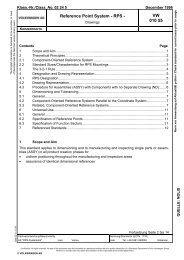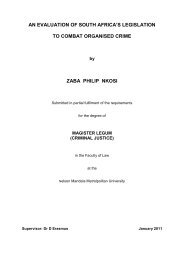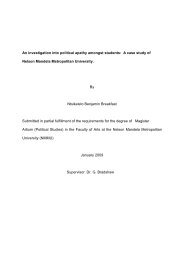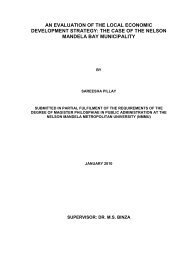Guro Lauvland Bjorknes.pdf - NMMU
Guro Lauvland Bjorknes.pdf - NMMU
Guro Lauvland Bjorknes.pdf - NMMU
You also want an ePaper? Increase the reach of your titles
YUMPU automatically turns print PDFs into web optimized ePapers that Google loves.
1997 the 50 000 war veterans demanded $2000 each in pension every month and also a $50 000<br />
bonus. There were claims by 50 percent of the war veterans who had no land to stay on that they<br />
be awarded land by December 1997 and the rest claimed that they be given land before July<br />
1998 (Meredith, 2002:134-36). They threatened the government by saying they would invade<br />
white-owned farms if their demands were not met: “… they will occupy white man‟s land<br />
because the white man did not buy that land” (2002:136).<br />
After the fund that was originally meant to pay the war veterans had been depleted, a new way to<br />
provide them with compensation had to be found. The government therefore increased various<br />
taxes such as sales tax and the tax on electricity (Hill, 2003:97).<br />
2.2.5 Land Reform in Zimbabwe<br />
The issue of land can be traced back to the 1890s when white settlers started entering the<br />
country, but it was in 1930 in the form of the Land Apportionment Act that the land was<br />
formally divided according to race, with whites being given the advantage. However, most of<br />
the indigenous people stayed in the areas designated for whites until after the Second World War<br />
when land was given to men who had served in the war. Europeans also entered the country as<br />
part of an agenda to improve settler agriculture in the 1950s (Mbiba, 2001).<br />
The Land Apportionment Act of 1930 made sure that the only way that Africans could enter the<br />
cities and industrial centres was if they worked for white settlers. They were situated a good<br />
distance from the white areas. Cities were to stay as white and European as possible but in the<br />
1960s Africans were able to rent houses through their work. Some elite Africans accomplished<br />
ownership of their own property. Strict laws sustained the racist policies regarding movement.<br />
The Africans were supposed to return to the Native reserves to which they had been restricted<br />
under the RF regime. Ranger in Mbiba (2001) recorded that Africans from Zambia, Malawi and<br />
Mozambique who worked in the mines or for the white farmers were shunned during the<br />
liberation war in the 1970s as they worked for the white settlers. And this hatred also blossomed<br />
after independence in 1980 and 1996 onwards as the political crisis escalated and they were often<br />
blamed by ZANU PF for supporting the opposition and foreign interests (Mbiba, 2001). The<br />
article also argues the fact that in order to suppress Africans evolving, they were restricted to the<br />
14


